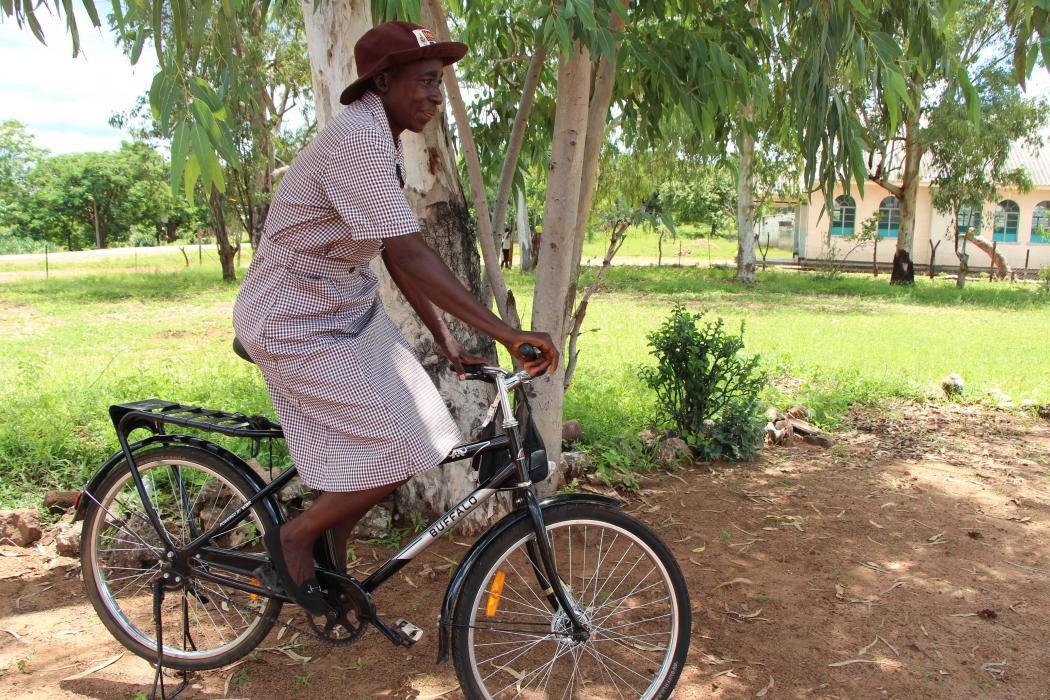Improve the Lives of Frontline Health Workers and their Patients with Bicycles

Regina, a community health worker in Zimbabwe, rides her bicycle to visit a household in her rural community. Photo courtesy of World Bicycle Relief.
Since 1950, the World Health Organization (WHO) has sponsored World Health Day to raise awareness of the challenges and opportunities in global health. This year the day marks the 75th anniversary of the WHO's global efforts to advocate for and activate change in the global health sector. The "Health for All" theme envisions that "all people have good health for a fulfilling life," yet 30% of the global population cannot access essential health services.
Although investments in global health increased by 36% between 2019 and 2020, low-income countries still grapple with underfunded health systems. On the ground, frontline health workers and their patients are impacted when they do not receive the financial and logistical support they need to serve their patient population. For example, health workers in rural areas often travel long distances to provide health services in their community. A survey of community health workers (CHWs) in Ethiopia found that they spend more time in transit to see patients than treating patients.
"Without any means of transport, the workload becomes unbearable," says CHW Regina.
This was the case for Regina, a community health worker (CHW) in the Hwange region of Zimbabwe. She travels over 8 kilometers per day to conduct home visits in her catchment area and educate families about preventative health practices and personal hygiene, monitor and treat common conditions, and identify and refer complicated cases to the nearest clinic or hospital. But she did it all on foot.
“Without any means of transport, the workload becomes unbearable. You are not able to cover the number of expected households,” Regina says. “I also need to attend the health center regularly for meetings and training, and it is very far away. During awareness and vaccination campaigns, because of the distances, I would have to prioritize the villages closest to me.”
My organization, World Bicycle Relief (WBR), has partnered with health ministries and civil society organizations to distribute more than 180,000 bicycles to CHWs in seven countries to accelerate the progress and magnify the impact of critical health care programs. These bicycles ensure CHWs spend less time in transit and more time with patients, help CHWs obtain and deliver medicines and family planning, engage clients more frequently, and help improve CHWs' job satisfaction. In our partnership with PATH in Kenya, six months after bicycle distribution, health workers with bicycles reached 88% more patients compared with those without bicycles.
Bicycles ensure CHWs spend more time with patients, and improve job satisfaction.
WBR partnered with Zimbabwe's Ministry of Health to distribute bicycles to CHWs, and Regina received hers in 2021. Now that she's on wheels, she says she's able to spend more time providing quality services and counseling families on the importance of looking after their health.
While WBR works nationally, our partners are located all over the world. Catholic Medical Mission Board (CMMB), for example, works globally to strengthen health care within communities, and community health workers are a critical element. CMMB CEO Mary Beth Powers says, “Our partnership with WBR to distribute nearly 2,500 bicycles has dramatically increased CHW efficiency. We estimate they’re able to travel twice as quickly—thereby reaching more households, diagnosing and treating more people, and delivering more essential care. It’s also easier to get to training and meetings with their supervisors and clinic staff."
We're excited to grow our partnerships and provide transportation to more CHWs around the globe. We’re also advocating for more US investment in global health, health systems, and even in bicycles. We’re supporting House Bill 992/Senate Bill S. 4962, “Bicycles for Rural African Transport Act,” by Representative Blumenauer and Senator Durbin. The bill would establish within USAID's Office of Gender Equality and Women’s Empowerment of the United States Agency for International Development "a rural mobility program to promote mobility in rural communities through access to affordable, fit-for-purpose bicycles, to provide support to sustainably increase access to rural areas, and for other purposes." The bill authorizes funding starting at $3 million for FY 23-24 and increasing thereafter.
If you live in the US and would like to support passage of this bill, use this form to send a message to your representative and senator, and ask them to consider cosponsoring this bill. Learn more about the potential impact this bill could have on rural communities in Africa here.
A lot has changed since the WHO established the first World Health Day, but there's so much more to be done—including ensuring health workers can reach the one billion people that live in rural areas with quality health services. Here's to another 75 years of progress in global health.
